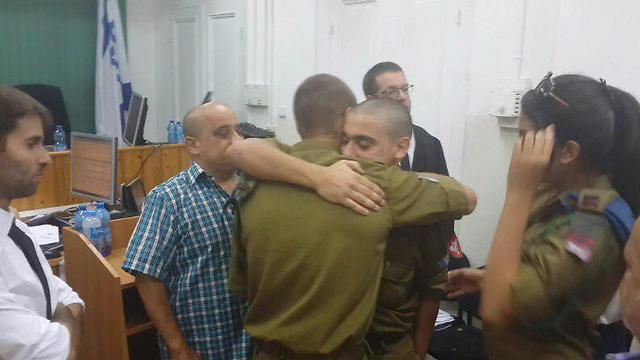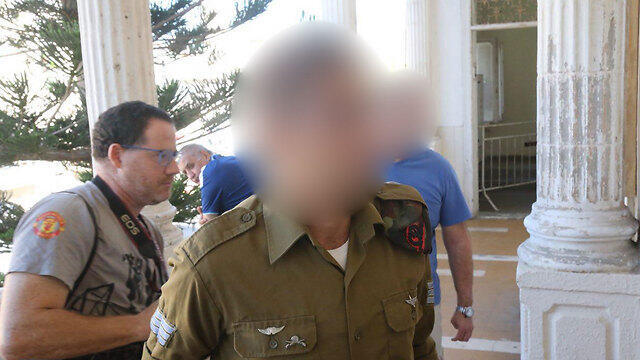The soldier who was wounded during a March stabbing attack in Hebron—shortly before Sgt. Elior Azaria shot the seriously wounded terrorist —testifiedon behalf of the defense Sunday morning.
The soldier ‘A.’ opened by telling the court that he sensed a threat of an explosive device, a line of defense which has been robustly pushed by Azaria’s defense team to justify his actions. Asked whether he believed that the terrorist could have been strapped with an explosive belt, A. responded unequivocally, “yes.”
2 View gallery


Sgt. Elor Azaria with the witness who was stabbed during attack (Photo: Yoav Zitun)
(צילום: יואב זייתון)
The prosecutor immediately engaged in an exchange with the witness, challenging his testimony and pointing to contradictory evidence he previously provided during and investigation with the military criminal investigation division (CID).
“I immediately recognized the terrorist in white who was walking regularly with his hands out and the second terrorist was hunched over with his hands in his pockets, A. recalled. “This immediately aroused suspicion and I immediately saw that something was not right. During the checks they did not stop at the metal detector. They went around it. They avoided it so that if they had a knife or a bomb it would not be apparent.”
The witness went on to recount the details of how the incident unfolded. “The second the commander told them to go back. I saw that something wasn’t right. They stood and looked at each other. I put my hand on my gun, the terrorist in white pulled out a knife, ran at my platoon commander and tried to stab him twice,” A. said.
“The platoon commander’s gun jammed so he ran back. I loaded my gun and shot six bullets at the terrorist who fell. Then I thought, ‘where is the second terrorist? Perhaps he is trying to detonate an explosive device or something? I felt two stabs from behind. I turned around and the terrorist pushed me. I shot while I was falling and the terrorist started to escape,” he continued.
“I am still of the belief that terrorist constituted a threat, that he had an explosive on him or something that he did not yet manage to detonate. I began running after him. He stopped, looked at me and saw that I wasn’t managing to work my gun and he ran at me again.”
Prosecutor: Your initial testimony is different
Responding to the prosecutor's allegation that A. had previously provided contradictory evidence during a preliminary investigation by the CID, the soldier said: “During the incident I was in shock. I had been stabbed. I shot both terrorists and I believed that both of them had been neutralized and didn’t seem to constitute a threat.”
“You never said during the time of the attack that you thought that one of the terrorists had a bomb on him,” the prosecutor insisted, to which A. said the CID never asked him about his thoughts in the field. However, the prosecutor continued to press A. on the point. “During your first testimony they allowed you to say everything that happened in the incident. You never said, at any stage, that you thought there was an explosive device on one of the terrorists.” To this, A. replied, “correct.”
The witness was asked why he never warned of the danger of an explosive device. “I was in shock,” he repeated. “I was tending to my wounds. Everyone already knew that the terrorist was still alive so I didn’t need to say.”


